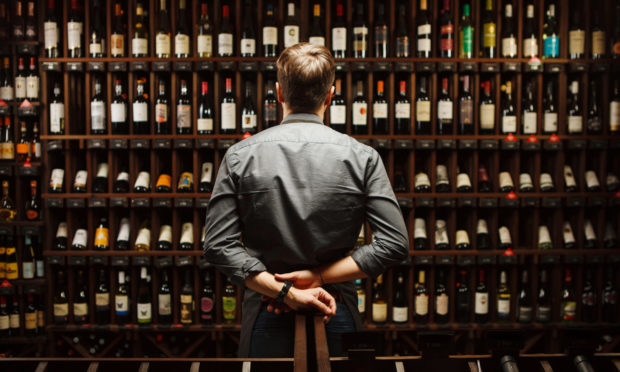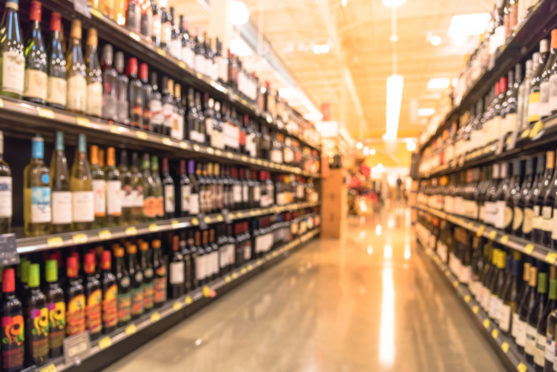While those wineries supplying to supermarkets may have seen surges in demand, for many the shutdown of restaurants and bars has led to an excess of stock and urgent efforts to find new outlets.
Soaring supermarket wine sales in recent months left some vineyards struggling to cope with the sudden surges in demand.
But booming off-trade sales are only part of the story. Take a look at the wider industry, and there are many wineries that have been adversely affected by widespread restaurant, bar and hotel closures – the core outlets for fine wines and those more artisan varieties that don’t crowd supermarket shelves.
With hospitality firms now reopening in many countries, including Scotland and the rest of the UK, there is a chance for recovery. But the ongoing pandemic means on-premise sales are likely to be depressed for some time to come. Now, with winery stocks in surplus, there are plenty of bargains to be found for consumers.
Batches of special offer wines and champagnes are becoming a common sight in supermarkets and off-licences, and customers of online merchants will be rubbing their hands at some of the discounts on premium labels.
Financial services company Rabobank’s latest Wine Quarterly forecasts that sales in full-service restaurants and bars will not return to 2019 levels until after 2022, adding to the pressure for premium wholesalers and wineries.
Last week the French government announced it was increasing a support package for wineries to 250 million euros following the impact of restaurant and bar closures alongside US tariff increases which have hit exports of all European wines and spirits, including Scottish gin and whisky.
Stephen Rannekleiv, global sector strategist, beverages, with Rabobank, says there is no quick-fix for wineries and distributors.
He said: “Some markets are much more heavily skewed to the on-premise than others. You look at markets like Spain and nearly half the market is in the on-premise and it’s heavily dependent on it. It’s an important channel for many smaller wineries who don’t necessarily have the scale to penetrate the large off-premise venues. So the loss of the on-premise has been really hard.
“In markets like the US we’ve made up for most, if not all, of the volume lost on the on-trade with the on-premise but it’s a much lower margin offering so, however you slice it, there’s been an enormous amount of margin lost for the industry because of the loss of the on-trade.
“Looking forward, that doesn’t get solved quickly. The challenges we’re seeing in the on-trade for a variety of reasons are going to be with us for a long time.”
Watch Clare’s interview with wine industry specialist, Stephen Rannekleiv.
With some stores struggling to keep up with demand for wine during lockdown, Stephen says this temporary boom only really benefited a limited number of producers.
He added: “There’s certainly going to be a lot of pressure on small wineries and not just them. There’s a knock-on effect to all this as well. The loss of the on-premise business also creates pressure on the distributors that service the small wineries because they were very dependent on the on-premise so those guys are in trouble.
“Losing sales channels creates a lot of pressure for smaller wineries and I think there will certainly be some that come up for sale and that’s a concern.
“It’s been a wake-up call and we’ve been talking about the need for the wine industry to invest in e-commerce for some time. There’s been a lot of lip-service paid to it but then, when it came to allocating resources, behind closed doors they were saying, ‘It’s a small channel and a negligible part of our sales’. They weren’t looking at the fact that was where all the growth was coming from and that’s where the industry was moving.
“This pandemic has really forced the issue because so many people who were afraid to go out signed up for e-commerce deliveries. Now everyone is sitting up and taking notice in a way they hadn’t before. Our position is that this is really the time for wineries to think creatively about engaging the consumer through e-commerce not just direct to consumer sales but recognising the consumer is doing more online and there are opportunities to engage them in creative ways and use the internet to do that.”
Online wine retailer Naked Wines recently suggested the pandemic has created a lasting shift towards digital sales, with chief executive Nick Devlin reporting “strong repeat trading momentum as we see evidence of new customers recruited during the Covid-19 pandemic converting to repeat customers”.
Mark Crawford, business development manager at online wine merchant Exel Wines based in Perth, says they have seen a similar surge in orders but believes only time will tell whether they will convert to regulars in the long-term.
He said: “For us as an internet supplier we’ve never had it so good. We’re two to three times up on the volume of sales we usually had at this time last year.
“We’ve probably seen over 1,000 new customers. That said I just don’t know how many of them will still be there in a year’s time. Some might return to old trends, going back into shops to buy, but an awful lot of people will have learned buying online is easy for them.
“There’s also been a bit of a backlash around ‘buy local, don’t buy from internet merchants’ so I don’t know how all of that will play out in the long-term.”
But with surplus stocks of wine globally at the moment, Mark says this is a good time for consumers looking to snap up premium labels at bargain prices.
“If there is a broad rule then [lockdown] has probably hit the smaller producers more than it has hit the bigger producers. That said we’ve seen plenty of bigger producers struggling as well. It’s not just about access to supermarkets. There are plenty of big producers that because of their prestige-point – these are people selling wines at more than £20 a bottle – are not choosing to sell via supermarkets and they too have struggled.
“We’re one of Scotland’s largest independent retailers online of wine and we’ve never had as many producers approach us from across the world in the last few months and ask, ‘Would you like to take our wines?’
“We’ve definitely seen most of the UK’s big importers are very dependent on the on-trade, so wines that would usually be sent to the three-star Michelin restaurants are not being sold. We’ve been approached by a number of major importers saying, ‘We’ve got some ridiculously good German Riesling that we’d never usually think about giving to you, would you like to take it to the market and sell it?’ We’ve seen a lot of that.
“We’ve also seen a lot of those wines cut down in price. A couple of the importers are going absolutely crazy in an attempt to try to sell wines that would normally be going out to pubs, clubs, restaurants, using their own channels to the market, knocking 30-40% off. It’s creating a bit of contention because those importers are trying to go direct to the market cutting out their own distribution networks.
“If you shop around you will find wines online and in shops that aren’t finding a route to market through on-trade. There are wines out there that need to be sold.”



